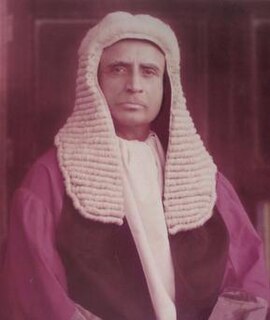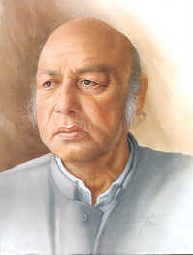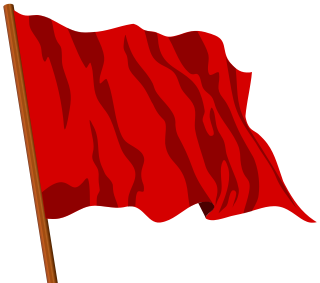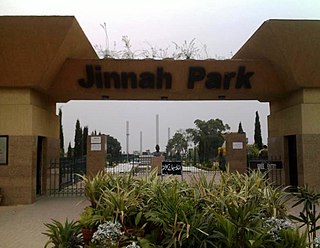Related Research Articles

Rawalpindi, is the capital city of Rawalpindi Division located in the Punjab province of Pakistan. Rawalpindi is the fourth-largest city proper in Pakistan after Karachi, Lahore and Faisalabad respectively while the larger Islamabad-Rawalpindi metropolitan area is the country's third largest metropolitan area. Rawalpindi is adjacent to Pakistan's capital of Islamabad, and the two are jointly known as the "twin cities" on account of strong social and economic links between the cities.

Khan Abdul Wali Khan was a British Indian and later Pakistani secular democratic socialist and Pashtun leader, and served as president of Awami National Party. Son of the prominent Pashtun nationalist leader Abdul Ghaffar Khan, Wali Khan was an activist and a writer against the British Raj like his father.
Mir Ghulam Murtaza Bhutto was a Pakistani politician and leader of al-Zulfiqar, a Pakistani left-wing militant organization. The son of Zulfikar Ali Bhutto, the former Prime Minister of Pakistan, he earned a bachelor's degree from Harvard University and a master's degree from the University of Oxford. Murtaza founded al-Zulfiqar after his father was overthrown and executed in 1979 by the military regime of General Zia-ul-Haq. In 1981, he claimed responsibility for the murder of conservative politician Chaudhry Zahoor Elahi, and the hijacking of a Pakistan International Airlines airplane from Karachi, during which a hostage was killed. In exile in Afghanistan, Murtaza was sentenced to death in absentia by a military tribunal.

Chief Justice Sheikh Anwarul Haq, was a Pakistani jurist and an academic who served as the 9th Chief Justice of Pakistan from 23 September 1977 until resigning on 25 March 1981. He hanged Z.A Bhutto in a controversial murder case on April 4, 1977.

Habib Jalib was a Pakistani revolutionary poet, left-wing activist who opposed martial law, authoritarianism and state oppression. Pakistani poet Faiz Ahmed Faiz said that he was the poet of the masses. He opposed military coups and administrators and was duly jailed several times.
Al-Zulfiqar was a Pakistani left-wing Insurgency organization. It was formed in 1979 by Murtaza Bhutto and Shahnawaz Bhutto after their father, then-Prime Minister of Pakistan Zulfikar Ali Bhutto, was deposed in a military coup and executed. Al-Zulfiqar was formed to avenge Bhutto's killing by means of armed struggle against the military regime of General Zia-ul-Haq. Zia had deposed the Bhutto regime after mass protests across Pakistan that were related to the dissatisfaction of the masses with the rule of Bhutto in a Military coup in July 1977.

The Wali Khan faction of the National Awami Party was formed after the 1967 split in the original NAP between Maulana Bhashani and Khan Wali Khan. The Wali Khan faction was later named National Awami Party (NAP) after the separation of East Pakistan.

Agha Iftikhar Ahmad is a Pakistani research journalist and a political activist. Ahmad started his career in 1980, after his release from jail and joined Jang Media Network and held a senior position in the Network. Ahmad is currently serving as Director of Elections, Investigations, Special Projects, and Research (EISPAR) for the Geo News Network (GNN). Iftikhar Ahmad also hosted interview show Jawab Deyh on Geo News TV channel for over 10 years.
The Pakistan coup attempt of 1995 or Operation Khalifa was a secretive plot hatched by renegade military officers and against the government of Benazir Bhutto, the Prime Minister of Pakistan. The plotters aimed to overthrow the constitutional government and establish a Military Rule in Pakistan. The plot was foiled after intelligence agencies tipped off the Pakistan Army. Despite the failure, the coup attempt would weaken Bhutto's government considerably in the aftermath.
Maulvi Mushtaq Hussain was a Pakistani jurist who served as chief justice of the Lahore High Court. Most notably in his career as a judge, he presided over the trial of former prime minister of Pakistan, Zulfiqar Ali Bhutto.
Chaudhry Zahoor Elahi was a Pakistani politician who rose to prominence from a small town of Gujrat, Punjab, Pakistan.
Operation Fair Play was the code name for the 5 July 1977 coup by Pakistan Chief of Army Staff General Muhammad Zia-ul-Haq, overthrowing the government of Prime Minister Zulfikar Ali Bhutto. The coup itself was bloodless, and was preceded by social unrest and political conflict between the ruling leftist Pakistan Peoples Party government of Bhutto, and the right-wing Islamist opposition Pakistan National Alliance which accused Bhutto of rigging the 1977 general elections. In announcing the coup, Zia promised "free and fair elections" within 90 days, but these were repeatedly postponed on the excuse of accountability and it was not until 1985 that ("party-less") general elections were held. Zia himself stayed in power for eleven years until his death in a plane crash.
Under the government of General Zia-ul-Haq from 1977 to 1988, there was significant political and military repression in Pakistan. Among the complaints against the Muhammad Zia ul-Haq administration were its repression of press and journalists, repression of rape victims imprisoned for zina under its Hudood Ordinances, and its repression of protestors. Protestors were repressed particularly violently after the execution of Pakistan's first democratically elected Prime Minister Zulfikar Ali Bhutto and during the Movement for the Restoration of Democracy campaign.
Nazar Hussain Kiyani was a Pakistan Peoples Party politician.

Pakistan International Airlines Flight 326 was hijacked by the militant insurgency group Al-Zulfiqar, led by Murtaza Bhutto, in March 1981. The hijacking went on for thirteen days, starting on the 2nd of March, and ending on the 15th. It was a routine flight scheduled from Karachi to Peshawar, but the hijackers diverted it to Kabul, Afghanistan, and then Damascus, where the hostage situation ended with the release of prisoners by the Pakistani government.
Central Jail Rawalpindi is a prominent prison in Rawalpindi, Pakistan.
Ahmed Saeed Nagi, was a noted Pakistani painter artist. He was known as the 'official artist' of the Pakistan freedom movement.

Jinnah Park is an amusement and public park located on Airport Road in the high-security Chaklala Cantonment suburb of Rawalpindi, Pakistan. It is the town's primary amusement park and covers an area of approximately 17 hectares. Initial plans for its development began as early as 1995 and it was opened in 2006. It was named after Quaid-e-Azam Muhammad Ali Jinnah, the founder and the first Governor-General of Pakistan. Sculptures of Jinnah and his family name are placed at the park’s main entrance.
The family of head of state and government in Pakistan is an unofficial title for the family of the head of state or head of government of a country. In Pakistan, the term First Family usually refers to the head of state or head of government, and their immediate family which comprises their spouse and their descendants. In the wider context, the First Family may comprise the head of state or head of government's parents, siblings and extended relatives.
References
- ↑ Khattak, Inamullah (7 September 2012). "Jinnah Park — a bone of contention". DAWN.COM. Retrieved 11 July 2020.
- ↑ Khattak, Inamullah (7 September 2012). "Jinnah Park — a bone of contention". DAWN.COM. Retrieved 12 July 2020.
- ↑ "On this day: Bhutto Hanged". DAWN.COM. 4 April 2009. Retrieved 12 July 2020.
- ↑ "Pindi Jail Not Too Old to Be Demolished" Sadiq Jafri. The News, 12 April 1992.